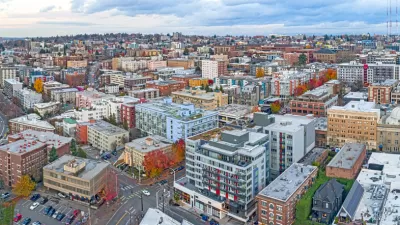UCLA Professor Donald Shoup has criss-crossed the nation lecturing about the many benefits from market pricing of parking -- but he says too many cities are still making decisions based on politics.
"..[P]lanning departments always insist that developers include a minimum number of parking spots[, but] Shoup doesn't have much respect for the ability of urban planners to determine how many spots are necessary. Since planners don't learn anything about parking in school, they learn it on the job, but because parking is so political – NIMBY neighbours constantly squawk at the thought of anyone parking on their street – what they really learn is the politics of parking.
"Planning will be looked back on as worse than phrenology, because phrenology didn't do any harm," he said, referring to the nineteenth-century pseudoscience that claimed to be able to determine character and other traits from the size and shape of a cranium.
The harm abundant free parking does feeds on itself: All that land dedicated to parking, which often sits empty for much of the day, increases sprawl, and that sprawl makes alternatives such as public transit and walking less feasible, which forces more people into cars, which increases the need for more parking."
"Although ideas seem like so much common sense, Shoup still feels they're underappreciated...Still, he knows some planners are curious because he receives more invitations to speak than he can accept. Cities pay him large lecture fees, fly him first class and then wine him and dine him, but they don't all do what he suggests because parking is so political."
FULL STORY: How the politics of parking can defile a city

Planetizen Federal Action Tracker
A weekly monitor of how Trump’s orders and actions are impacting planners and planning in America.

Canada vs. Kamala: Whose Liberal Housing Platform Comes Out on Top?
As Canada votes for a new Prime Minister, what can America learn from the leading liberal candidate of its neighbor to the north?

The Five Most-Changed American Cities
A ranking of population change, home values, and jobs highlights the nation’s most dynamic and most stagnant regions.

San Diego Adopts First Mobility Master Plan
The plan provides a comprehensive framework for making San Diego’s transportation network more multimodal, accessible, and sustainable.

Housing, Supportive Service Providers Brace for Federal Cuts
Organizations that provide housing assistance are tightening their purse strings and making plans for maintaining operations if federal funding dries up.

Op-Ed: Why an Effective Passenger Rail Network Needs Government Involvement
An outdated rail network that privileges freight won’t be fixed by privatizing Amtrak.
Urban Design for Planners 1: Software Tools
This six-course series explores essential urban design concepts using open source software and equips planners with the tools they need to participate fully in the urban design process.
Planning for Universal Design
Learn the tools for implementing Universal Design in planning regulations.
New York City School Construction Authority
Village of Glen Ellyn
Central Transportation Planning Staff/Boston Region MPO
Institute for Housing and Urban Development Studies (IHS)
City of Grandview
Harvard GSD Executive Education
Regional Transportation Commission of Southern Nevada
Toledo-Lucas County Plan Commissions





























